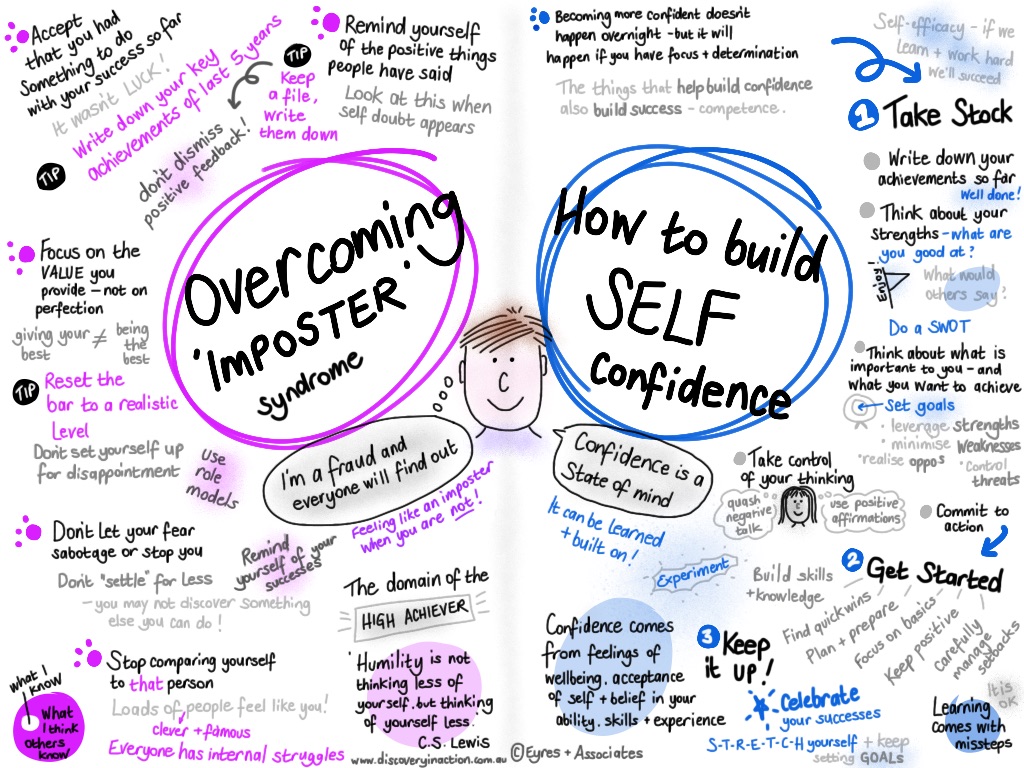We all experience feelings of insecurity, but when we suffer from imposter syndrome, or the belief that we do not deserve our accomplishments, our best energy is zapped. Yet, we do not have to remain a victim to those feelings; in fact, there are many ways we can healthily deal with this widespread affliction.
Here are some strategies for addressing imposter syndrome:
1. Raise your awareness. When we notice we are having these feelings, we want to write them down so we can explore further. How would I describe these feelings? When do they emerge? The more we are aware of our anxieties, the smarter we can become about how they operate, and the easier it will be to either shrug them off next time they pop up, or have a planned approach to deal with them.
2. Flip your script. You can rewrite your mental programs to serve you. Instead of being debilitated by imposter thoughts, you can say, “it is common to have these feelings when I am doing something outside my comfort zone, that’s where all the possibility lies.” Mistakes and self-doubt come with the territory. If I was not feeling this, then I would be worried because I could possibly be a robot.
3. Be kind to yourself. When you do well, celebrate and reward yourself, do not just keep trucking along. When you make a mistake, be patient and compassionate with yourself as errors come with the territory. What can you say to make yourself feel better and move on?
4. Reframe failure. Winston Churchill said, “Success is not final; failure is not fatal, it is the courage to continue that counts.” What would it be like if you celebrated failure because it meant that you tried, and that is where all the learning occurs? That’s the approach taken by CEO of Spanx Sarah Blakey. She shared an experience about when she was growing up at the dinner table, how her dad used to ask her and her brother what they failed at and then they would celebrate it. To encourage her team to take risks and fail, Blakey calls failures “oops” and wants her team to learn and laugh about them.
5. Experiment with vulnerability & seeking support. It is natural to want to keep those feelings of insecurity a secret. But when you can reveal your doubts to trusted partners, whether it be a friend, mentor, or professional coach, you break its power when you realize you are not alone and get to learn how others tackle the same challenge. I usually find that there are many more people out there who are eager to help and that can be quite reassuring as there is power in numbers.
6. Know your strengths. When I work with clients who experience imposter syndrome, I help them discover their best selves. Many of us were built to have negative orientations because it is what kept us alive in ancient times because we needed to spot threats. That’s why now we can easily find our weaknesses while overlooking our most endearing qualities, especially if they come easy to us. Getting in touch with our strengths can serve as an incredible source of power.
7. Know your life purpose. Ok, maybe a tall order, but it is nice to spend time pondering. Mark Twain reminds us, “the two most important days in your life are the day you’re born, and the day you find out why.” Knowing our purpose and values serves as a stable foundation in those moments when we are simply unsure about ourselves, the situation, and the ever-changing, rapidly-moving world.
8. Normalize imposter feelings. Guess who said these lines – “You think, why would anyone want to see me again in a movie?” “I don’t know how to act anymore, so why am I doing this?” None other than Meryl Streep. If somebody as successful and skilled as Meryl can feel these limiting beliefs, we all can.
9. Challenge it. When we throw around these assertions, how often do we question them? Is this true, logical, constructive? What is the evidence against it? Do not blindly take those internal scripts as truths. When you parse fact from fiction, you can regain control.
We all experience imposter syndrome at various times. While there is no one right approach to begin to combat the feeling, the most important action we can take is to experiment with different methods that can be beneficial for us to perform at our best.
As a leadership development coach, I work with people to deal more powerfully with these experiences, contact me to explore this topic further.
Quote of the day: “What’s talent but the ability to get away with something?” —Tennessee Williams
Q: What is the best way you have found to deal with feelings of self-doubt? Comment and share below, we would love to hear from you!


